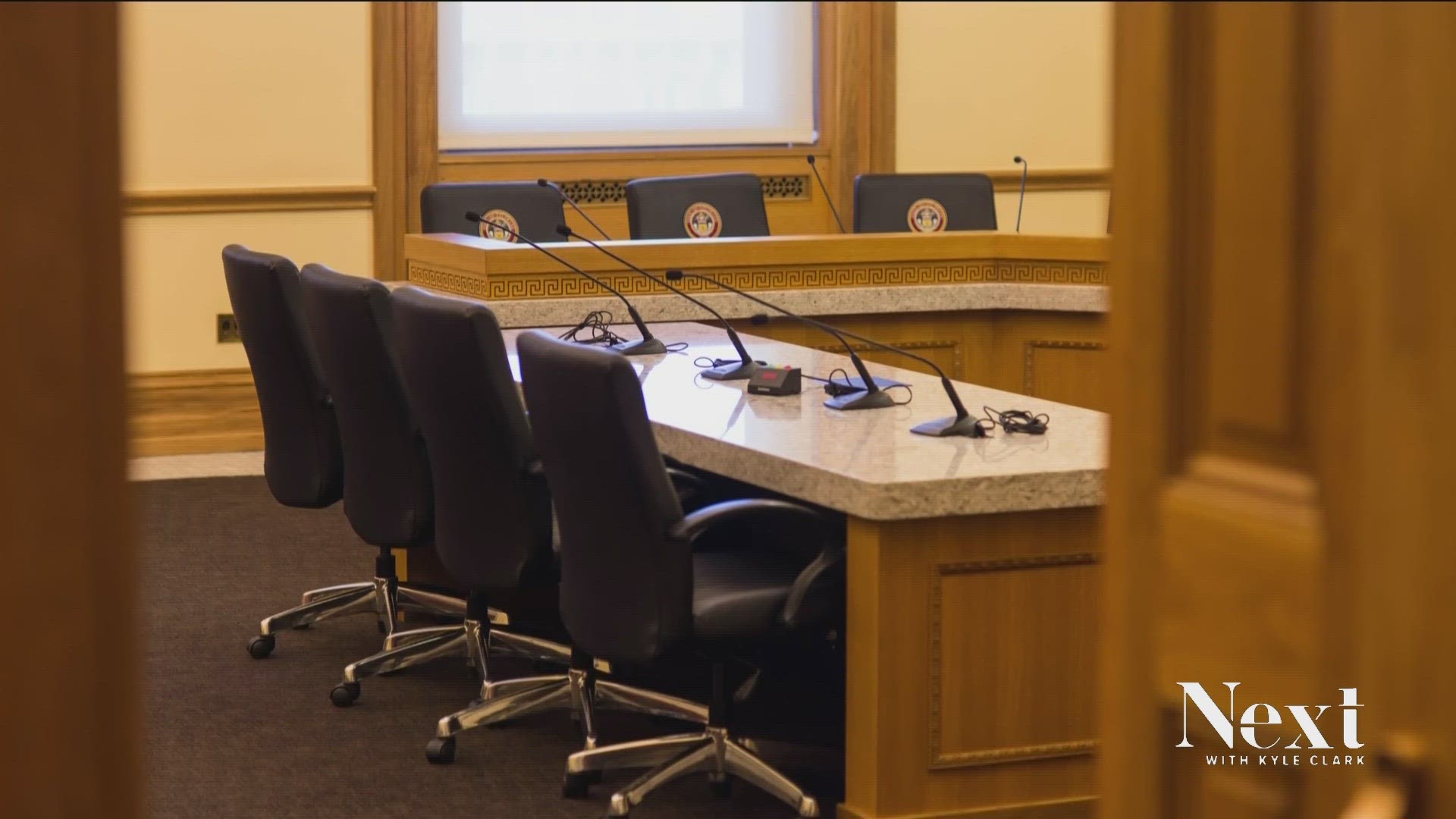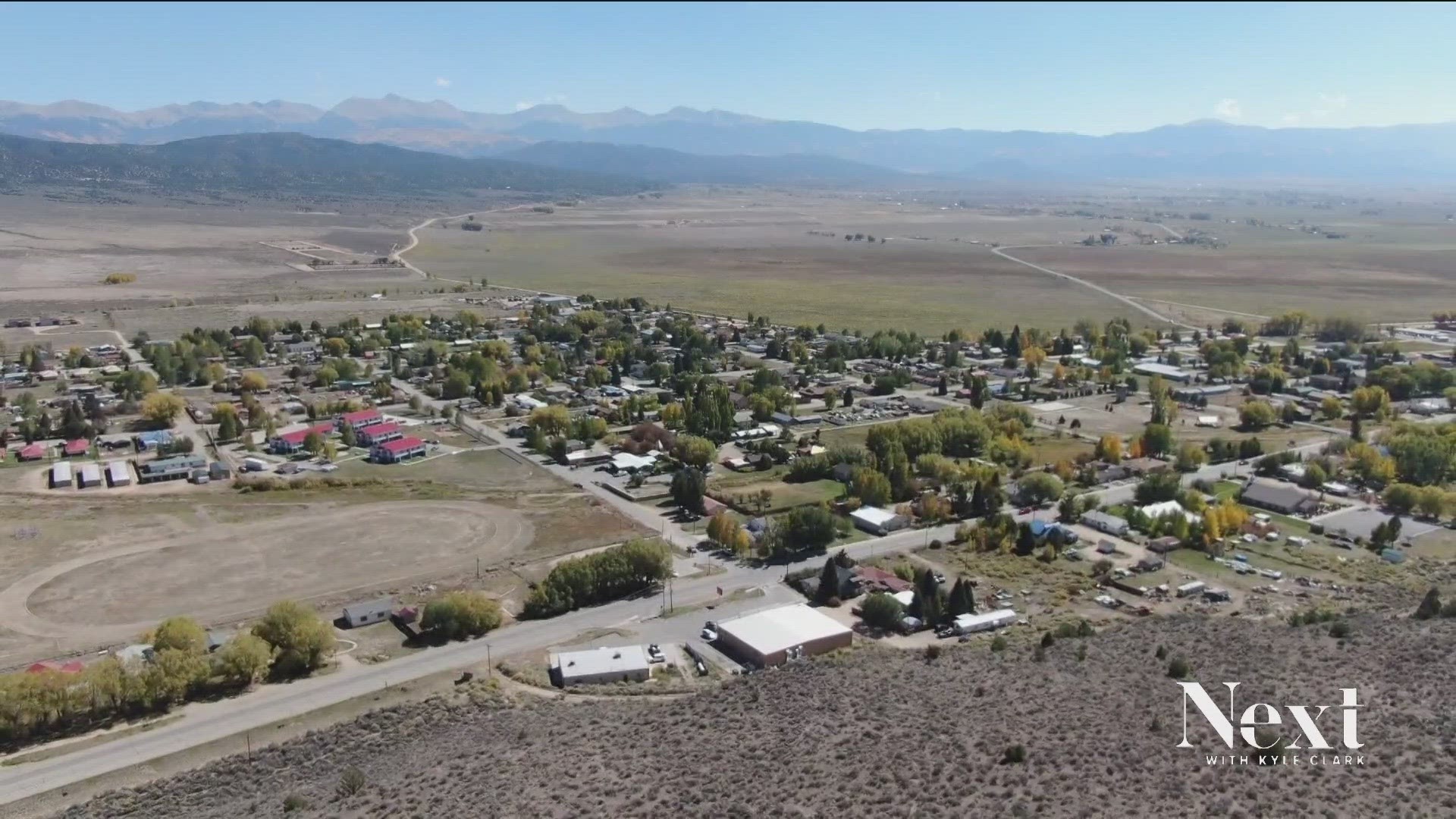DENVER — When the state legislature comes back to work on Jan. 10, policies from last year will be brought back to life, and perhaps, hurt feelings.
On Wednesday, Democratic House Speaker Julie McCluskie, D-Dillon, and Senate President Steve Fenberg, D-Boulder, laid out their policy plans in an interview with Next with Kyle Clark.
But first, McCluskie answered questions about internal conflict within Democrats following the resignation of two lawmakers: Ruby Dickson and Said Sharbini, both citing vitriol, as well as a criticism from State Rep. Alex Valdez, D-Denver, for a lack of diversity among Democratic committee chairs.
Division among Democrats
Zelinger: “If this were a sports team, I'd be asking the coach, ‘why are you letting this happen?’ So Speaker, why are you letting this happen?”
McCluskie: “Marshall, I'm shocked by the question. I mean, we've seen hateful rhetoric at the national level for years now. We've seen name calling and disrespectful debate. And, I believe, for the first time we are seeing shadows of that in Colorado. But I fiercely defend our implementation of rules and decorum in the House, and the efforts that we have taken to promote a constructive collaborative working environment."
Committee chair appointments are traditionally for two years. McCluskie explained why she did not make changes.
McCluskie: “It is unusual to make significant changes midstream on any committee appointments. But at that time, we were celebrating and continue to celebrate the diverse representation of people of color in our leadership team. It is not typical, nor would it be, I think, successful for members on the leadership team to also serve in chair positions. There were four individuals that, very likely. would have served in a chair position, but they were all running for outside races, either the mayor's race, or the Denver City Council race, and declined to take any leadership position, including Representative Valdez, they did not choose nor have the desire to serve in that role.”
The four she referenced are:
- Valdez, who briefly ran for Denver mayor.
- State Rep. Leslie Herod, who ran for Denver mayor.
- Serena Gonzalez-Gutierrez, who ran for Denver city council.
- Adrienne Benavidez, who resigned before the session started in 2023.
McCluskie: “It would be highly unusual for me to remove a chair of a committee who is performing successfully, meeting expectations after one year of their term and replace them with someone who has now become available to serve in that role."
Though, she did replace two members of the judiciary committee. Last month, McCluskie removed State Reps. Elisabeth Epps and Bob Marshall as voting members on the committee. Both sued Democratic and Republican leadership last year, claiming they made decisions on legislation outside of the public’s view. During the November special session, Epps joined a group in the gallery protesting in support of Palestinians and interrupted a lawmaker’s speech.
Zelinger: "You removed two members of the Judiciary Committee, Elisabeth Epps, Representative abs and Representative Bob Marshall, that would seem unusual. So why is that?"
McCluskie on Epps: “In the case of the Judiciary Committee, I was concerned about some of the relationships and how I had seen interaction between members, and I was concerned about the appropriateness of the conduct of a member after special session, and that is why I made changes to the Judiciary Committee."
McCluskie on Marshall: “I would point you, for the Judiciary Committee, the overall interaction, interpersonal interactions with members of that committee, and my desire to make sure that we are able to achieve our policy agenda with the appointments I have made."
Zelinger: "What are you doing to address the concerns that have been voiced by lawmakers who have left or lawmakers that have just voiced concern about what's going on inside the Capitol?"
McCluskie: “We have talked about our workplace expectations policy. We have talked about our workplace harassment policy. We are currently working on a tool to help members better understand, specifically, what behaviors may fall in or out of those policies,” McCluskie said. “We are working on specific examples that may help members better understand what adherence to a rule might be or what violation of a rule might be.”
2024 Policy Efforts
McCluskie said her first policy effort is to continue something the legislature is doing for the first time in 14 years, fully fund K-12 education.
McCluskie: “Getting back to ground zero for our public schools. We've had the ‘negative factor’ or the ‘Budget Stabilization Factor’ hanging over our heads since 2010. And now, after 14 years, we are going to be getting back to a level playing field."
Since 2009, the legislature has used a mathematical formula called the ‘negative factor’ or ‘budget stabilization factor’ to reduce the amount of state funding to each school district equally. This is the first year that will not happen.
McCluskie: “I hope those dollars are going into teacher salaries and benefits, maintaining smaller classroom sizes and certainly ensuring that every kid in the state has a world class, public education."
The policy agenda for Senate Democrats is summed up in three areas.
Fenberg: “I think all three of these are very interconnected. And it's housing, its transit and it's our climate agenda."
A controversial land use bill died at the legislative session last year. It would have given the state more power in land use decisions that are currently, and historically, handled by local governments.
Zelinger: "Democratic lawmakers push back on local control changes. And to I mean, the organizations that represent cities and counties and local districts push back on that. Are they involved in how it gets brought back? Or is this something that gets brought back and rammed down their throat again?"
Fenberg: “There have been a lot of conversations and stake holding happening since last session. I think the core of the policy is something that everybody actually all agreed was necessary, which is have regional plans, where cities and different communities come together, and they figure out what are the needs of that area.”
The bill will be back this year.
“The problem is that, I think, the bill last year just had too much in it. And there was a lot for people to like, and a lot for people to dislike, and sometimes that recipe resulted in it not having enough votes at the end of the day to get across the finish line,” Fenberg said. “The policy will be broken out into separate pieces. So people can support some oppose others.”
Zelinger: “Is that the Prop HH lesson? Breaking it up?”
Fenberg: “No, I think it’s a lesson of land use is complicated. It's personal. And it impacts every community in a different way.”
Regarding transit, Fenberg said bills will incentive local governments to develop near rail transit and bus stops, using federal infrastructure money.
Zelinger: "You mentioned finishing the Northwest Rail. Kyle has a countdown that, I don't know, I think we're at 2046 or something on the board that he's got by his desk. Is that going to reduce that time to something sooner?"
Fenberg: “This federal money is probably our last and final opportunity to actually build these projects. That is going to help us turn the Front Range Rail concept into reality, and to finally fund the Northwest Rail that's up in my neck of the woods in the Boulder, Longmont, northern Colorado area, and do things like actually envisioning what mountain rail could look like, to connect broad range communities to the western slope.”
The northwest rail is the rail line promised by RTD as part of the 2004 voter-approved FasTracks plan. It has never been built.
Zelinger: "Do you mean RTD doesn't have a plan to finish it by that date when you said you don't think there's a plan to finish it by that date?"
Fenberg: “All I know is that there has been money collected from all of us, every year, put into a savings account, to one day build something. But I'm not sure that anybody thinks that one day will ever come unless we step in and figure out a path forward that includes the feds, that includes RTD, that includes the state and all the communities that will be impacted by those projects."
You can watch the full interview here:
SUGGESTED VIDEOS: Next with Kyle Clark


